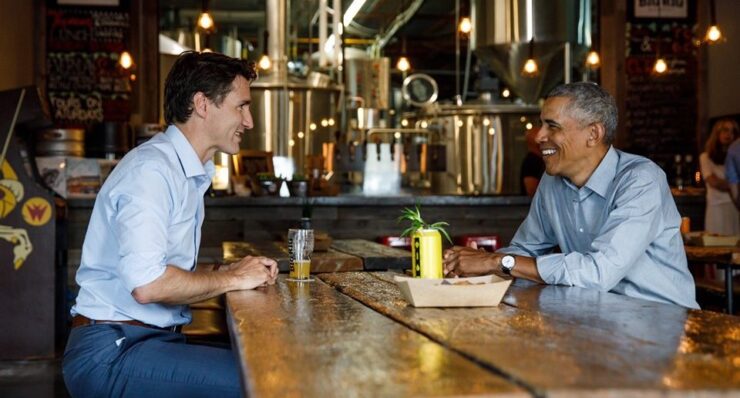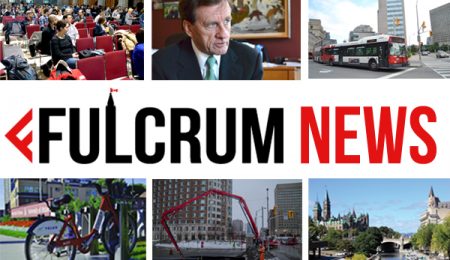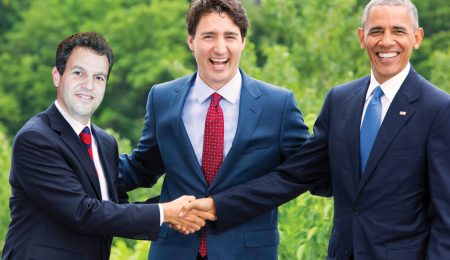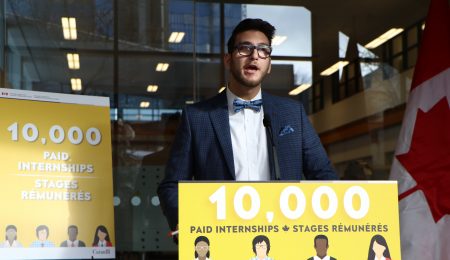FORMER PRESIDENT TALKS CANADA-U.S. RELATIONS, DIGITAL TECH IN EXCLUSIVE OTTAWA EVENT
“Few presidents have walked a more improbable path to the White House,” was the aptly-put introduction to none other than Barack Obama, during an armchair conversation at the Canadian Tire Centre on May 31.
The event, hosted by progressive think-tank Canada 2020, saw the 44th U.S. president sit down with Tobias Lütke, founder and CEO of Shopify, to discuss digital technology and fake news, entrepreneurship, and the current global political climate, among other topics.
Obama opened by reflecting on his first visit to Ottawa in February 2009, noting that historically, the first foreign visit a U.S. president makes after taking office is to Canada. He shared that the United States’ influence on the world stage is magnified by the relationship it has with countries like Canada.
Together, the United States and Canada have a major impact globally, and a core commitment to a “liberal, market-based democracy” and certain international rules regardless of which political party is in government.
Lütke also asked the former president about the decline in entrepreneurship since the 1970s. Obama responded “one ingredient for entrepreneurship is a public sector that creates a platform for entrepreneurs to succeed,” discussing the role of government in small business growth—everything from well-maintained roads and airports, to a judicial system that enforces intellectual property laws.
The former president also highlighted the role of a sound public education system, particularly at the postsecondary level, in developing and sharing ideas which contribute to the formation of new business ventures.
Obama added that we need to rethink our education system if we want to spark creativity and new ideas in young people, who are not getting what they need by sitting at a desk for hours on end. This current model of education is not preparing the next generation for a rapidly changing and increasingly digital workforce.
A significant portion of the discussion focused on both the benefits and challenges of this growing digital landscape. Obama shared that it is “important for us to not overhype the dangers of new technology,” as this technology connects people around the world and shares information instantaneously. Citizens are more aware of crises in other countries, which in turn helps put pressure on governments and leaders to respond.
In a nod to the over 1,000 Ottawa-area youth present at the event, Obama added that technology is producing a new generation that is more tolerant and culturally aware than ever before.
However, he warned that we cannot become too comfortable with this technology, saying that our brains have not yet adapted to this information overflow and thus cannot easily decipher between what is true and what is essentially fake news. This, coupled with a “splintered” media landscape, leaves people in echo chambers and unable to agree on basic facts.
Therefore, according to Obama, tech companies should have an honest conversation about using their monopoly on information-sharing for social good. This also requires us to teach young people how to seek out the right information and better recognize what is not true, he said.
The conversation did come with some more lighthearted moments. Obama discussed his marriage to Michelle, whom he described as an “original” who uses her platform — including her new book — to encourage people, especially girls and women, to use their voices for good.
He also talked about his daughters, Sasha and Malia, and admitted that while there were some challenges in raising them in a place like the White House, both he and Michelle were able to instill certain core values in them. “You can find a timeout corner anywhere,” he laughed, musing that the girls are his greatest accomplishment.
As he touched on the current political climate and how to be a better public servant and citizen, Obama shared that politics is less about where you want to end up and what you want to be, but more about what you want to do. “At its core, politics is about values.” Meeting young people through his travels has kept him optimistic, Obama added, because of the good work they are doing, rather than their focus on titles and grandiose ideas.
“It’s indisputable that things have gotten better … but we cannot be complacent.” According to the former president, a “primal, zero-sum” politics is gaining traction globally, which must be combated by science and facts, rather than fear. However, as he highlighted, progress is neither linear nor inevitable, and we are indeed moving in a positive direction overall.





